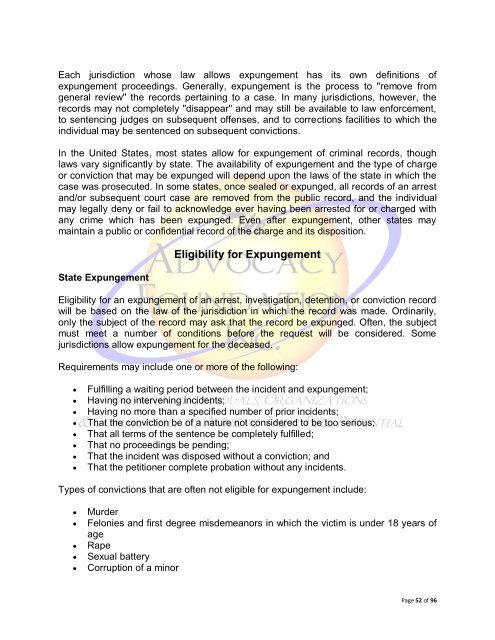Law for The Poor
Law for The Poor
Law for The Poor
Create successful ePaper yourself
Turn your PDF publications into a flip-book with our unique Google optimized e-Paper software.
Each jurisdiction whose law allows expungement has its own definitions of<br />
expungement proceedings. Generally, expungement is the process to "remove from<br />
general review" the records pertaining to a case. In many jurisdictions, however, the<br />
records may not completely "disappear" and may still be available to law en<strong>for</strong>cement,<br />
to sentencing judges on subsequent offenses, and to corrections facilities to which the<br />
individual may be sentenced on subsequent convictions.<br />
In the United States, most states allow <strong>for</strong> expungement of criminal records, though<br />
laws vary significantly by state. <strong>The</strong> availability of expungement and the type of charge<br />
or conviction that may be expunged will depend upon the laws of the state in which the<br />
case was prosecuted. In some states, once sealed or expunged, all records of an arrest<br />
and/or subsequent court case are removed from the public record, and the individual<br />
may legally deny or fail to acknowledge ever having been arrested <strong>for</strong> or charged with<br />
any crime which has been expunged. Even after expungement, other states may<br />
maintain a public or confidential record of the charge and its disposition.<br />
State Expungement<br />
Eligibility <strong>for</strong> Expungement<br />
Eligibility <strong>for</strong> an expungement of an arrest, investigation, detention, or conviction record<br />
will be based on the law of the jurisdiction in which the record was made. Ordinarily,<br />
only the subject of the record may ask that the record be expunged. Often, the subject<br />
must meet a number of conditions be<strong>for</strong>e the request will be considered. Some<br />
jurisdictions allow expungement <strong>for</strong> the deceased.<br />
Requirements may include one or more of the following:<br />
<br />
<br />
<br />
<br />
<br />
<br />
<br />
<br />
Fulfilling a waiting period between the incident and expungement;<br />
Having no intervening incidents;<br />
Having no more than a specified number of prior incidents;<br />
That the conviction be of a nature not considered to be too serious;<br />
That all terms of the sentence be completely fulfilled;<br />
That no proceedings be pending;<br />
That the incident was disposed without a conviction; and<br />
That the petitioner complete probation without any incidents.<br />
Types of convictions that are often not eligible <strong>for</strong> expungement include:<br />
<br />
<br />
<br />
<br />
<br />
Murder<br />
Felonies and first degree misdemeanors in which the victim is under 18 years of<br />
age<br />
Rape<br />
Sexual battery<br />
Corruption of a minor<br />
Page 52 of 96

















